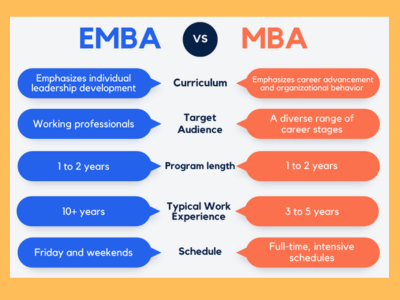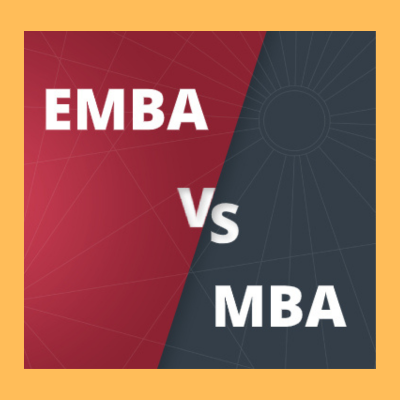Executive MBA vs MBA: Executive MBA (EMBA) and Master of Business Administration (MBA) are two of the most sought-after degrees in the business world. Both programs are designed to provide students with a comprehensive understanding of business concepts and practices, but there are some key differences between the two.
EMBA programs are designed for experienced professionals who want to enhance their leadership skills and advance their careers. On the other hand, MBA programs are more suitable for recent graduates or individuals who want to switch careers. EMBA programs usually have a more flexible schedule, allowing students to continue working while pursuing their degree. MBA programs, on the other hand, are usually full-time programs that require students to take a break from their careers.
When deciding between an EMBA and MBA program, it is important to consider factors such as program structure, admission requirements, career impact, and financial considerations. By doing so, students can choose the program that best fits their career goals and lifestyle.
Key Takeaways
- EMBA programs are designed for experienced professionals, while MBA programs are more suitable for recent graduates or individuals who want to switch careers.
- EMBA programs usually have a more flexible schedule, allowing students to continue working while pursuing their degree, while MBA programs are usually full-time programs that require students to take a break from their careers.
- When deciding between an EMBA and MBA program, students should consider factors such as program structure, admission requirements, career impact, and financial considerations.
Defining Executive MBA and MBA
Executive MBA (EMBA) and Master of Business Administration (MBA) are both graduate-level business degrees that are designed to equip students with the necessary skills and knowledge to excel in the business world. However, there are some key differences between these two programs that distinguish them from each other.
MBA programs are typically geared towards recent graduates or professionals who are in the early stages of their careers. These programs provide a broad-based education in business fundamentals, such as finance, accounting, marketing, and management. MBA students can choose to specialize in a particular area of business, such as entrepreneurship, healthcare, or finance.
On the other hand, EMBA programs are designed for experienced professionals who are looking to enhance their leadership and strategic abilities. EMBA students are typically mid-career professionals who want to take the next step in their careers and move into senior management positions. EMBA programs focus on advanced business concepts, such as leadership, strategic planning, and organizational behavior.
| MBA Program | EMBA Program |
|---|---|
| Geared towards recent graduates or early-career professionals | Designed for experienced mid-career professionals |
| Provides a broad-based education in business fundamentals | Focuses on advanced business concepts |
| Students can choose to specialize in a particular area of business | Enhances leadership and strategic abilities |
| Typically full-time, part-time, or online | Typically part-time or executive format |
| Internships are available for full-time MBA students | No internships available |
In terms of format, MBA programs can be full-time, part-time, or online, while EMBA programs are typically offered in a part-time or executive format. MBA programs usually require students to complete a summer internship, while EMBA programs do not offer internships.

Program Structure
Executive MBA (EMBA) and Master of Business Administration (MBA) programs are both graduate-level business degrees, but they differ in their program structures.
Curriculum Focus
EMBA programs are designed for experienced professionals who want to enhance their leadership and strategic abilities. The curriculum focuses on advanced business concepts and leadership skills. EMBA students typically have more work experience than MBA students, and the program is designed to accommodate their busy work schedules. On the other hand, MBA programs are designed for students who want to gain a broad understanding of business concepts and prepare for a career in business. The curriculum covers a wide range of business topics, including finance, marketing, management, and operations.
Class Schedule and Duration
EMBA programs are typically structured to accommodate the busy schedules of working professionals. Classes are often held on weekends or in the evenings, and the program can be completed in as little as 18 months. MBA programs, on the other hand, are often full-time programs that can take two years to complete. Some MBA programs offer part-time or online options, which can be completed in as little as 12 months.
In summary, EMBA programs are designed for experienced professionals who want to enhance their leadership and strategic abilities, while MBA programs are designed for students who want to gain a broad understanding of business concepts and prepare for a career in business. EMBA programs are structured to accommodate the busy schedules of working professionals, while MBA programs are often full-time programs that can take two years to complete.
Admission Requirements and Process
Both Executive MBA (EMBA) and MBA programs require applicants to have a bachelor’s degree from an accredited institution. However, EMBA programs typically require applicants to have more extensive work experience than MBA programs. For example, the Wharton EMBA program at the University of Pennsylvania requires applicants to have at least ten years of work experience, while their full-time MBA program requires only two years of work experience.
Another difference between EMBA and MBA programs is the admissions process. EMBA programs tend to have a more selective admissions process than MBA programs. This is because EMBA programs are designed for working professionals who are already established in their careers, while MBA programs are designed for recent college graduates who are just starting out in their careers.
Applicants to EMBA programs are typically required to submit a resume, essays, letters of recommendation, and transcripts from all undergraduate and graduate institutions attended. Some programs may also require applicants to take the GMAT or GRE exam, although this is becoming less common.
Overall, the admissions process for both EMBA and MBA programs can be competitive, and applicants should be prepared to put in significant effort to prepare their application materials and demonstrate their qualifications to the admissions committee.
Career Impact
An MBA or Executive MBA can have a significant impact on an individual’s career. Here are some ways in which these degrees can help with career advancement:
Career Advancement
Both MBA and Executive MBA programs can help individuals advance in their careers. According to a survey by the Graduate Management Admission Council (GMAC), 75% of MBA graduates worldwide reported that their degree helped them achieve their career goals. Additionally, 92% of Executive MBA graduates reported that their degree helped them achieve their career goals.
An MBA or Executive MBA can help individuals gain the skills and knowledge necessary to take on leadership roles within their organizations. These programs often include coursework in areas such as finance, accounting, marketing, and operations management, which can help individuals gain a deeper understanding of how businesses operate.
Networking Opportunities
Networking is an important aspect of career advancement, and both MBA and Executive MBA programs can provide individuals with valuable networking opportunities. These programs often bring together individuals from a variety of industries and backgrounds, which can help individuals expand their professional networks.
Executive MBA programs, in particular, can be beneficial for individuals who are looking to network with other experienced professionals. These programs often require several years of work experience and are designed for individuals who are already in leadership roles within their organizations.
Overall, both MBA and Executive MBA programs can have a significant impact on an individual’s career. These programs can provide individuals with the skills, knowledge, and networking opportunities necessary to advance in their careers and take on leadership roles within their organizations.
Financial Considerations
When considering an MBA or Executive MBA program, one of the most important factors to consider is the financial cost. This section will explore the tuition costs and return on investment of both programs.
Tuition Costs
Tuition costs for an MBA program vary widely depending on the school and program. According to Investopedia, the average cost of an MBA program in the United States is around $60,000, with some programs costing upwards of $100,000. Executive MBA programs tend to be more expensive than traditional MBA programs due to their accelerated nature and the fact that they cater to working professionals who are still earning a salary. However, some Executive MBA programs may offer scholarships or financial aid to offset the cost.
Return on Investment
The return on investment (ROI) of an MBA or Executive MBA program is an important consideration when deciding whether to pursue one of these degrees. According to a study by the Graduate Management Admission Council, the median base salary for MBA graduates in the United States was $115,000 in 2020, with some graduates earning over $200,000 per year. The study also found that the median salary for Executive MBA graduates was $150,000 per year.
While the ROI of an MBA or Executive MBA program can be significant, it is important to consider the full cost of the program, including tuition, fees, and any lost income from taking time off work to complete the degree. It is also important to consider the long-term career prospects and earning potential that a degree can provide.
In summary, the financial considerations of pursuing an MBA or Executive MBA program are significant and should be carefully weighed before making a decision. While the cost of these programs can be high, the potential ROI can make them a worthwhile investment for those looking to advance their careers in the business world.
Learning Environment
When it comes to the learning environment, there are some notable differences between Executive MBA (EMBA) and Master of Business Administration (MBA) programs. This section will explore the student demographics and teaching methods used in both types of programs.

Student Demographics
EMBA programs are designed for experienced professionals who are looking to advance their careers while still working full-time. As a result, EMBA students tend to be older and have more work experience than MBA students. According to a Coursera article, EMBA students are typically in their mid-30s to early 40s and have an average of 14 years of work experience. In contrast, full-time MBA students are usually in their mid-20s to early 30s and have an average of five years of work experience.
Teaching Methods
One major difference between EMBA and MBA programs is the delivery of coursework. Full-time MBA candidates attend school full-time, may live on or near campus, and don’t usually have time for a full-time job while pursuing their degree. EMBA programs usually schedule classes outside of typical business hours, on Friday nights and weekends, to accommodate working professionals.
Another difference in teaching methods is the use of case studies. According to a BusinessBecause article, MBA programs tend to use case studies more frequently than EMBA programs. Case studies are a popular teaching method in business schools because they allow students to apply the concepts they learn in class to real-world scenarios.
Overall, the learning environment in an EMBA program is designed to be flexible and tailored to the needs of working professionals. MBA programs, on the other hand, offer a more traditional full-time student experience.
Global Perspective and International Opportunities
One of the key differences between Executive MBA and MBA programs is the global perspective and international opportunities that they offer. Executive MBA programs are designed for mid-career professionals who want to enhance their leadership skills and advance their careers. These programs are typically shorter in duration and more intensive than traditional MBA programs.
Executive MBA programs often require students to have significant cross-border experience and offer international opportunities that allow students to gain a global perspective on business. For example, the Wharton Executive MBA program offers Global Modular Courses (GMCs) that allow students to study in different countries and gain exposure to different business practices. The program also offers a Global Business Week that allows students to study in emerging markets such as China, India, and Brazil.
MBA programs, on the other hand, offer a broader range of opportunities for students who want to gain a global perspective on business. Many MBA programs offer study abroad opportunities, internships, and other international experiences that allow students to gain exposure to different cultures and business practices. For example, the Kellogg School of Management offers an International Business & Markets Program that allows students to study in different countries and gain exposure to different business practices.
In summary, both Executive MBA and MBA programs offer opportunities for students to gain a global perspective on business. However, Executive MBA programs are more focused on mid-career professionals who want to enhance their leadership skills and advance their careers, while MBA programs are more focused on students who want a broader range of opportunities to gain international experience.
Choosing the Right Program for You
When deciding between an Executive MBA and a traditional MBA program, it is important to consider your career goals, work experience, and personal circumstances. Here are some factors to keep in mind when choosing the right program for you:
Work Experience
EMBA programs are designed for experienced professionals who are already in leadership positions. These programs are typically more focused on practical, real-world applications of business concepts and strategies. On the other hand, traditional MBA programs are open to a wider range of applicants, including recent graduates and those with less work experience.
Time Commitment
EMBA programs are often designed to accommodate the busy schedules of working professionals. Classes are usually held on weekends or in the evenings, allowing students to continue working full-time while pursuing their degree. Traditional MBA programs, on the other hand, are often full-time programs that require students to devote all of their time to coursework

Curriculum
While both EMBA and traditional MBA programs cover similar business concepts and strategies, EMBA programs often focus more on leadership and strategic management. Traditional MBA programs may offer more elective courses, allowing students to specialize in a specific area of business.
Network
Both EMBA and traditional MBA programs offer opportunities to build a strong professional network. However, EMBA programs may offer more networking opportunities with experienced professionals in leadership positions. Traditional MBA programs may offer more opportunities to network with a diverse group of students, including recent graduates and those with less work experience.
Ultimately, the decision to pursue an Executive MBA or a traditional MBA will depend on your individual career goals, work experience, and personal circumstances. It is important to carefully consider all of these factors before making a decision.
Frequently Asked Questions
What are the key differences in curriculum between an Executive MBA and a traditional MBA?
The curriculum of an Executive MBA (EMBA) is designed for experienced professionals who want to enhance their leadership and strategic management skills. EMBA programs typically focus on advanced business concepts, with an emphasis on practical application. In contrast, a traditional MBA program usually covers a broad range of business topics, including accounting, finance, marketing, and management. The curriculum is designed to provide students with a strong foundation in business fundamentals.
How does the average salary post-graduation compare between Executive MBA and MBA graduates?
The average salary post-graduation for Executive MBA (EMBA) graduates is typically higher than that of traditional MBA graduates. This is because EMBA graduates are usually mid-career professionals who have already established themselves in their respective industries. They are seeking to advance their careers and increase their earning potential. In contrast, traditional MBA graduates are often recent college graduates who are just starting their careers.
What are the typical duration and scheduling differences between an Executive MBA and a traditional MBA program?
The duration of an Executive MBA (EMBA) program is usually shorter than that of a traditional MBA program. EMBA programs can be completed in as little as 18 months, while traditional MBA programs typically last two years. Additionally, EMBA programs often have a more flexible schedule, with classes held on weekends or in the evenings to accommodate working professionals. Traditional MBA programs usually have a more rigid schedule, with classes held during the day.
Can an Executive MBA be pursued online, and how does it differ from an online MBA?
Yes, an Executive MBA (EMBA) can be pursued online. Online EMBA programs offer the same curriculum as their on-campus counterparts, but with the added convenience of online coursework. Online MBA programs, on the other hand, are designed for students who want to complete their degree entirely online. While online MBA programs may offer some of the same coursework as an EMBA program, they are typically geared towards recent college graduates rather than mid-career professionals.
What are the potential career impacts of choosing an Executive MBA over a traditional MBA?
Choosing an Executive MBA (EMBA) over a traditional MBA can have a significant impact on one’s career. An EMBA program is designed to enhance the leadership and strategic management skills of mid-career professionals, making them more competitive in the job market. EMBA graduates are often sought after by top employers in their respective industries. In contrast, traditional MBA graduates may need to gain additional work experience before they can compete for top positions.
How do the costs of obtaining an Executive MBA compare to those of a traditional MBA?
The cost of obtaining an Executive MBA (EMBA) is typically higher than that of a traditional MBA program. This is because EMBA programs are designed for mid-career professionals who are already established in their careers and can afford to pay higher tuition fees. In contrast, traditional MBA programs are often more affordable, as they are geared towards recent college graduates who may not have as much work experience or earning potential.

